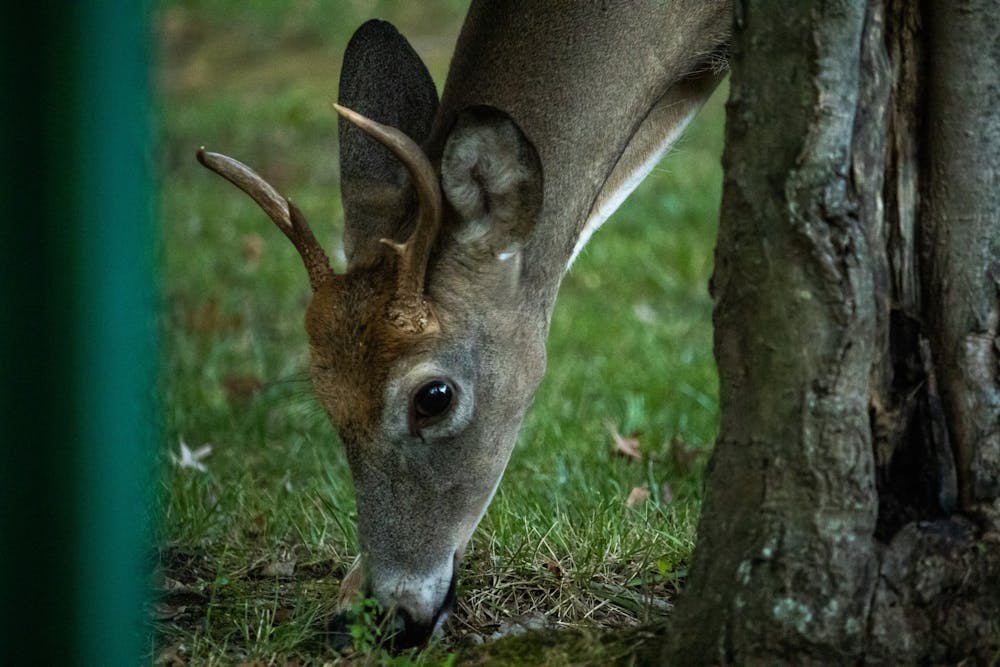By Myara Gomez
Staff Writer
On Oct. 25, The Ewing Green Team held a presentation by the stewardship director of Friends of Hopewell Valley Open Space, Dr. Michael Van Clef, on invasive species at the Hollowbrook Community Center in Ewing. The Senior Director of Sustainability and Energy Management, Paul Romano, attended the presentation and instantly felt concerned over the deer population on campus.
“Succinctly their overpopulation is eating most new native plant growth in forested areas and as a consequence forested area may not regenerate and plant species that support native animals and insects are not consistently available so are resulting in declines in their population,” said Romano. “Simultaneously, new invasive plant species and associated insects are flourishing as the deer do not prefer these.”
Romano also mentioned that this is not the only invasive species that is affecting the campus, these being spotted lantern flies. Van Clef also mentioned other types of invasive species in his presentation. For example, Japanese Barberry, European Buckthorn and Norway Maple.
Focusing on the deer population, Romano believes that there needs to be a balance between deer and humans — if either one dominates the other, one species suffers. For example, if the deer population is dominating, there is a higher risk of lyme disease, disease among the deer increases significantly and car accident numbers increase.
This has become a great concern among the campus community. Several students, including senior biology and secondary education major Bryan Wood, have noticed the excessive population of deer on campus.
“It’s hard to go a single night without seeing a couple of deer,” said Wood. “Sometimes, I’ll walk into a group of fifteen or twenty, and they’ll act like I’m interrupting their monthly meeting.”
Students on campus have noticed the number of deer increasing. These animals have become no stranger to the campus and roam freely. However, this is a safety concern for students and the population needs to be reduced significantly.
“Deer population is 10 times greater than historical numbers and they eliminate all plants below 5 feet tall that are palatable to them. Virtually all native trees and shrubs are palatable to deer. This eliminates competition that allows invasive species that are not palatable to deer to become abundant,” said Dr. Van Clef.
He also stated that the only predator of deer right now is humans. New Jersey used to have wolves and mountain lions but their populations have decreased significantly. Unfortunately, this means that the only way to minimize the deer population is by hunting them.
“At this point in time, there are no ways to minimize deer impacts without lethal controls (hunting). Relocation was attempted in limited cases - it was exceptionally expensive and very stressful for the deer, it is no longer practiced, mainly because there is nobody that wants to accept deer because they already have too many,” said Dr. Van Clef.
However, there are students that don’t want the deer to be hunted. Sophomore psychology major Alexander Vance believes that currently there aren't that many deer to the point where a hunting program is needed.
“I think hunting the deer population is unnecessary. Yes, TCNJ has a large deer population on campus but from my experience I haven’t had much of a problem staying out of their way,” said Vance. “Sometimes they’re nice to look at on my walk to class,”
Currently, the College does not have a plan to manage the deer population. However, a management plan will be needed. Romano stated that this is necessary to improve biodiversity on campus, and this can be done by using new landscaping practices.
“It can be very complicated, but controlled hunting programs can be implemented when carefully planned and performed,” Van Clef said. “TCNJ does have some properties away from campus with forest habitats and they could be a good place to start implementing controlled hunting through a deer management program.”







